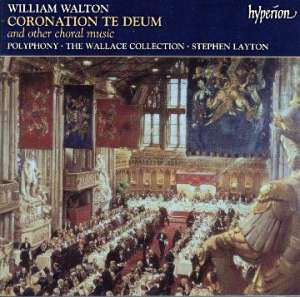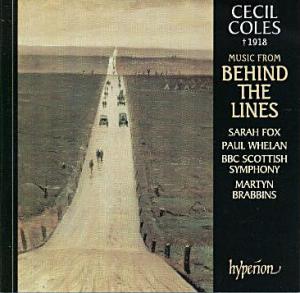Curio Corner
Sir William WALTON (1902-1983)
Coronation Te Deum; A Queen's Fanfare; A Litany (versions I II and III); The Twelve; Set me as a seal upon thy heart; Magnificat; Nunc Dimittis; Where does the uttered music go?; Jubilate Deo; Missa Brevis; Cantico del Sole; Make we joy now in this fest; King Herod and the Cock; All this time; What cheer?; Antiphon
Polyphony and The Wallace Collection with James Vivian (organ) conducted by Stephen Layton
HYPERION CDA67330 [76:36]
Crotchet
Cecil COLES (1888-1918)
Behind the Lines; The Comedy of Errors Overture; Fra Giacomo; Scherzo in A minor; Four Verlaine Songs; Suite from the Scottish Highlands
Sarah Fox (soprano); Paul Whelan (baritone)
BBC Scottish Symphony Orchestra conducted by Martyn Brabbins
HYPERION CDA67293 [62:44]
Crotchet
In a month in which there are so few releases of new film music, we are delighted to welcome two new Hyperion releases of colourful music by British composers.
The film music of Sir William Walton is, of course, familiar; the scores for Laurence Olivier's three Shakespearean films - Henry V; Richard III and Hamlet – plus Escape Me Never, The First of the Few (his splendid 'Spitfire Prelude and Fugue') and The Battle of Britain etc. Here is another equally imposing side of the composer – a taste of his ceremonial and church choral music. Walton is justly celebrated for his two wonderful coronation marches: Crown Imperial for the coronation of King George VI in 1937 and Orb and Sceptre for that of Queen Elizabeth II in 1953. His magnificent ceremonial Coronation Te Deum was also performed at that coronation with an expanded choir, accompanied by orchestra with added brass and organ. This new recording sumptuously recorded in the marvellous acoustic of Hereford Cathedral, features just organ and brass accompaniment but it lacks neither boldness nor grandeur. It is preceded by the stirring fanfare that Walton wrote for the Queen's entrance to the NATO Parliamentary conference in June 1959.
The bulk of the Walton programme is devoted to his liturgical works, all colourful, all musically adventurous, impassioned, sometimes reminiscent of the wayward harmonies of Belshazzar's Feast, often angular, and sometimes with jazzy syncopation. . Polyphony and The Wallace Collection sing Walton's complex tapestries with assurance and suave conviction. A musical treat for the adventurous
So many films have been set amid the horrors of the trenches of the Great War. Music from Behind the Lines was actually composed there. The manuscript is actually spattered with the blood and mud. Cecil Coles was killed near the Somme on 26th August 1918 during a heroic attempt to rescue some wounded comrades. He was in his 29th year. The Great War took its toll on many British composers: it also snatched the lives of Ernest Farrar and George Butterworth and seared those of others like Sir Arthur Bliss (composer of the film score of Things To Come) Ivor Gurney, E.J. Moeran and Patrick Hadley. But the life and work of Cecil Cole has until now lain all but forgotten. However, thanks to the persistence and research of his daughter, Penny Catherine Coles, his manuscripts, some embedded with shrapnel, have been painstakingly put together to create this first commercial recording of these works (or indeed of any of his music!).
Music from Behind the Lines consists of a short pastoral evocation ('Estaminet du Carrefour' – coffee house or tavern at the crossroads) of northern France landscapes with a central waltz that might have been heard at a local town dance and, more importantly, 'Cortège', a moving evocation of a military funeral procession – one of many that Coles must have witnessed in those grim days.
Coles's music shows influences of Wagner, Bruckner, Brahms and Richard Strauss. It is powerful and intensely dramatic and atmospheric. There is much programme music here. Perhaps the most impressive work is Fra Giacomo a setting of some macabre verses by Robert Williams Buchanan. It is a tale of revenge and murder and Coles seizes every opportunity to colour and accentuate its melodramatics. A merchant invites the monk, Fra Giacomo to pray over the body of his newly deceased wife. It soon becomes clear that the merchant had suspected his wife of infidelity. He had donned the disguise of a priest to discover, from her confessions, that the guilty one was none other than Fra Giacomo to whom he now confesses that he had not only poisoned his wife but also the drink that the monk was at that moment quaffing. The work ends with the merchant dumping the body of the guilty monk in the canal. Baritone Paul Whelan and Brabbins interpret these murky proceedings with relish.
Coles was interested in French poetry and the chansons of Fauré, Chausson, Debussy and Ravel. His imaginative and impressive Four Verlaine songs combine the elegance and refinement of French mélodies with a more darkly trenchant Germanic influence. 'Fantastic in Appearance' is a somewhat harrowing picture of a river gliding 'like death swells…' through a town. 'A slumber vast and black', is an intensely despairing song of lost love is written in a progressive post-Wagnerian style while 'Let's dance the jig' is a more defiant and stoical acceptance of lost love with Sarah Fox savouring its irony. Pastorale, is the sunniest song of the set, a quietly bucolic little piece.
The Comedy of Errors Overture, from Shakespeare's play of misunderstandings, mistaken identities and reversals of fortune, covers a broad spectrum of emotions from a darkly turbulent opening signifying despair to lyrical romantic episodes and comic burlesque. Influences are many and varied from Mendelssohn to Wagner and Mahler by way of Edward German and even a hint of Eric Coates! – but assembled convincingly and entertainingly. The satirical Scherzo in A minor is another evocative work in a similar vein. It is full of sardonic humour with in parts a demonic edge and Coles introduces some arresting harmonies and orchestrations. Occasionally, its rhythms might imply a Spanish setting. From the Scottish Highlands comprises a Mendelssohnian Prelude with a blolero-like dance. The central Idyll (Love scene) is unashamedly romantic; akin to Bruch or Tchaikowsky in its lusher moments while the concluding Lament broods darkly and menacingly but the trio is a tender waltz.
In truth Cecil Coles's music cannot be claimed to be a major find for its is the work of a young man yet to establish his own voice, it is often derivative and thematically non too strong. But it demonstrates Coles's penchant for the dramatic and a gift for writing evocative, atmospheric music. Like George Butterworth, who also died at the Battle of the Somme, he showed great promise. A notable find and a valuable addition to the British music archives. Hyperion and Martyn Brabbins, who contributed to the restoration of this music, are to be congratulated on the release of this enterprising album.
More reviews of these two albums will be found on MusicWeb our sister site and we hope to publish an interview with Martyn Brabbins on the music of Cecil Coles.
Ian Lace[Not rated]
Return to Index

